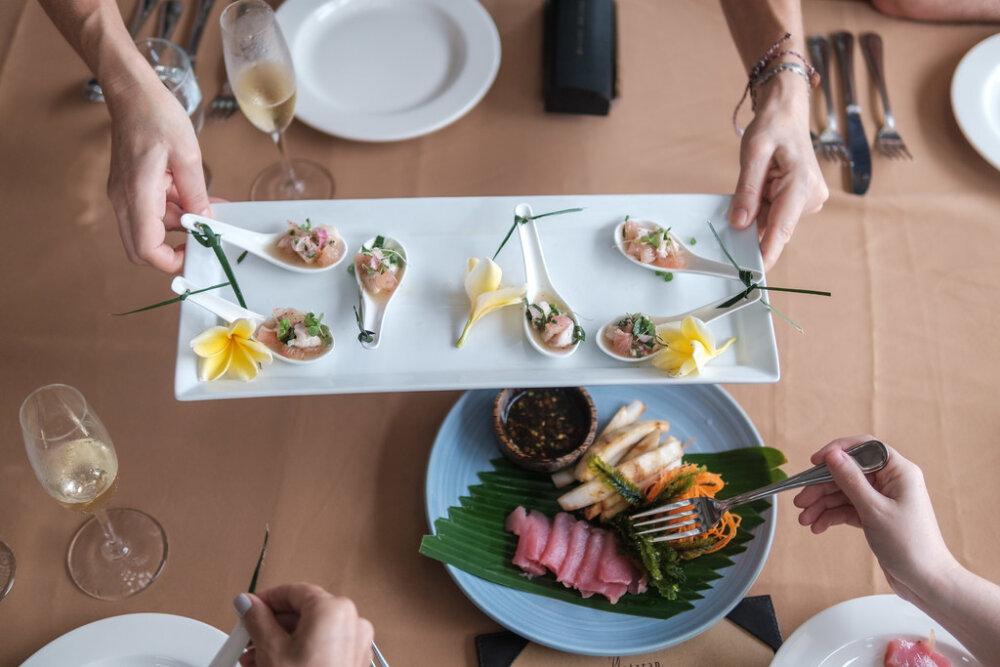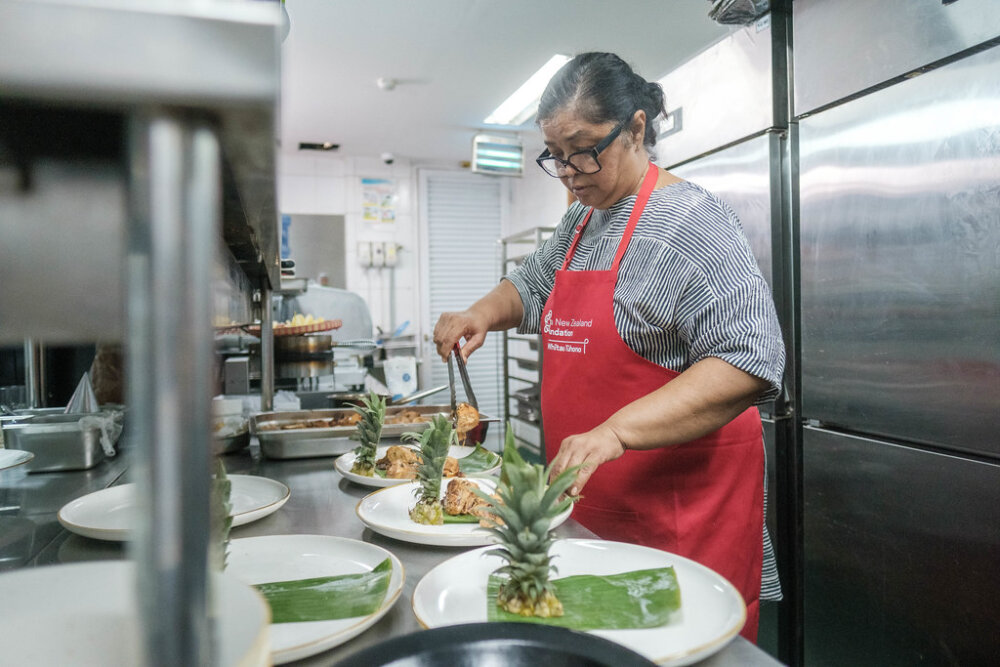I recently returned from the annual Ubud Food Festival – a three-day cross-cultural culinary adventure in Bali with Indonesian food as the star.
The festival showcases Indonesia’s diverse cuisine, innovative chefs and extraordinary local produce to audiences and chefs from near and far.
I was invited to the event to showcase Pacific food, including to give a masterclass alongside Fijian Chef Sangeeta Maharaj showcasing our recipe for Kokoda: Fijian ceviche.
I have been to many food festivals all over the world, but the Ubud Food Festival was worlds apart from any others I have been to.
Ubud had something for everybody.
I was thrilled to meet Charles Toto, founder of the Papua Jungle Chef Community, who is introducing his people and food culture to the world and promotes the eco value of promoting local Papuan gastronomy.
I know so little about Papua apart from what I read about the Indonesian governments military grip there (which Pacific people are aghast at), so it was great to get the human rather than solely political view of the country.
Charles is a food hero and so different from the celebrity chef genre we are used to - this guy is the real deal. He is moving his people forward, bringing his culture to us all.

Robert teamed up with Fijian Chef Sangeeta Maharaj to showcase their recipe for Kokoda: Fijian ceviche (Photo courtesy of Ubud Food Festival)
I sat on a panel with Rahel Stephanie of Spoons. Rahel is Indonesian and lives in London.
Her business, Spoons, is a pop-up Indonesian cuisine experience and Rahel herself is something of a cuisine ambassador for Indonesia. She’s not only creating Indonesian cuisine awareness, she’s making it cool.
What she does is both fun and important. Indonesian cuisine has not had the same place in the sun as, say, Thai or Vietnamese. Rahel wants to change that.
The story of the food is the story of the people
Cuisine is not just food - it represents people. The most quoted line from my TedX talk was “The story of the food is the story of the people” and along with the clear social aspect to this - people learning about each other through food – cuisine and cultural food are door openers for international trade. Just ask anyone from France or Thailand about that!
Rahel is an innovator who is doing amazing things for Indonesia, and I was impressed that a young woman is so highly purposed.
My connection to the Ubud Food Festival came through Helianti Hilman, founder of Javara Indigenous Indonesia. Her story is…well, frankly…amazing.
A Kings College-trained lawyer, she was working with indigenous communities across the Indonesian archipelago protecting their cultural knowledge from appropriation by large food companies. One day her husband said to her “This is a losing game. We need to get on the front end of this”
And with that Javara was born.
Robert Oliver: "There is so much for the Pacific to learn from Asia and vice versa." (Photo courtesy of Ubud Food Festival)
Through partnerships with farmers, foragers, fishers, and food artisans, Helianti founded Javara to put the indigenous communities in charge of their own business life.
In smart partnerships, they have developed an impressive range of the finest natural, organic, and artisanal food products originating from various regions of the Indonesian archipelago.
All their products are directly sourced, developed hand in hand with the communities and distributed to the Indonesian market plus to 30 international markets.
The processing plants are owned by the farmers themselves, with Helianti’s team helping them acquire financing.
Today, Javara works with over 7000 indigenous farmers throughout Indonesia and across the supply chain to give economic value to Indonesia’s often forgotten food heritage.
Javara puts the “value” in the value chain.
And alongside me from the Pacific came Fiji’s food icon and owner of Eden, Suva’s best restaurant, Sangeeta Maharaj.
Sangeeta’s restaurant offers a contemporary menu of Fijian cuisine with dishes that represent all of Fiji’s fabulous melting pot of cultures.
‘Local food' in Fiji has struggled to find foothold in Fiji’s ever-important tourism industry resulting in lots of food imports, a loss to Fiji’s farmers. Eden shows that local cuisine is indeed commercially viable in a restaurant setting.

Fijian chef Sangeeta Maharaj plating up a dish (Photo courtesy of Ubud Food Festival)
The festival provided me the opportunity to meet many more amazing chefs. I loved meeting the trio of Filipino chefs – Ross Magnaye, Serai and Thirdy Dolatre, and Kevin Navoi from Manila’s HAPAG, who dazzled diners with their Filipino Young Chefs Takeover at Indus.
What struck me overall was how everybody I met was motivated by vision far bigger than themselves, whether it be promoting and developing cuisine identity, bringing entrepreneurial opportunities to far flung communities or conserving food heritage.
Localising food systems in this way has significant positive ramifications for climate change, biodiversity loss, health and wellbeing, and identity.
I also reflected that I left Ubud full of inspiration and ideas. There is so much for the Pacific to learn from Asia and vice versa.
There is so much for the Pacific to learn from Asia and vice versa
People were happy to share ideas with each other in the uniquely enthusiastic atmosphere of Ubud Food Festival. I appreciate that the Asia New Zealand Foundation fundamentally understands this, which is why they supported my visit there.
Imagine a Javara in the Pacific. Imagine a Pacific Island Food Revolution modelled in Asia. I see parallels in Charles Toto’s work with that of Rewi Spraggon and Matua Joe McCloud.
We face many of the same challenges and have remarkably similar societies.
And huge kudos must go to the extraordinary Janet DeNeefe, the founder and driving force behind both the Ubud Food Festival and the Ubud Writers Festival.
A transplanted Australian, Janet has built a hospitality empire in Bali. She brings the astonishment of the onlooker of her Bali to us, and we are all the better for it.
Robert Oliver is a celebrated New Zealand chef who was raised in Fiji and Samoa and is renowned for his pioneering work in Pacific Island cuisine. His passion for cooking and global culinary experiences led him to become an advocate for the diverse flavors and traditions of the Pacific region. Notable for his acclaimed cookbook series, "Me'a Kai: The Food and Flavours of the South Pacific," Oliver promotes sustainable and locally sourced ingredients, emphasizing their importance for both the environment and local communities. With numerous awards, TV appearances, and philanthropic efforts, he continues to be a cultural ambassador, elevating the profile of Pacific Island cuisine worldwide.


